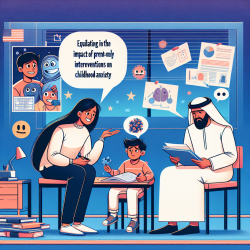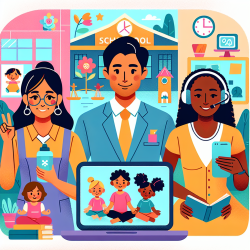Introduction
Childhood anxiety disorders present a significant challenge, impacting social, academic, and health outcomes. Traditional child-focused cognitive-behavioral therapy (CBT) has been the gold standard, yet many children do not respond to these treatments, and relapses are common. Recent research has begun to explore the potential of parent-only interventions, which show promise in addressing these issues.
Research Overview
The study titled "Piloting a one-day parent-only intervention in the treatment of youth with anxiety disorders: child and family-level outcomes" evaluates the effectiveness of a one-day workshop format of the Fear-Less Triple P (FLTP) intervention compared to the traditional six-week group format. Both formats aim to empower parents as agents of change in managing their children's anxiety.
Key Findings
- Both the one-day workshop and the six-week group formats resulted in significant improvements in child anxiety symptoms, with no significant differences between the two formats.
- The interventions also positively impacted sibling anxiety, suggesting a broader family-level benefit.
- Parent satisfaction with both formats was high, indicating the acceptability of parent-only interventions.
Implications for Practitioners
For practitioners in speech-language pathology and related fields, these findings highlight the potential of incorporating parent-only interventions into treatment plans for childhood anxiety. These interventions can be more accessible and cost-effective, particularly for families with limited resources or those living in rural areas.
Practitioners should consider the following strategies to enhance their practice:
- Explore parent-only interventions as a viable alternative or complement to traditional child-focused therapies.
- Encourage parents to actively participate in workshops that equip them with CBT strategies to manage their child's anxiety.
- Consider the broader family context, including sibling anxiety, when planning interventions.
Encouraging Further Research
While the study provides promising results, further research is needed to explore the long-term effects of parent-only interventions and their impact on various family dynamics. Practitioners are encouraged to contribute to this growing body of research by documenting outcomes and sharing insights from their practice.
Conclusion
Parent-only interventions offer a promising avenue for treating childhood anxiety, providing significant improvements in both child and family-level outcomes. By integrating these approaches into practice, practitioners can enhance the accessibility and effectiveness of anxiety treatments for children.
To read the original research paper, please follow this link: Piloting a one-day parent-only intervention in the treatment of youth with anxiety disorders: child and family-level outcomes.










